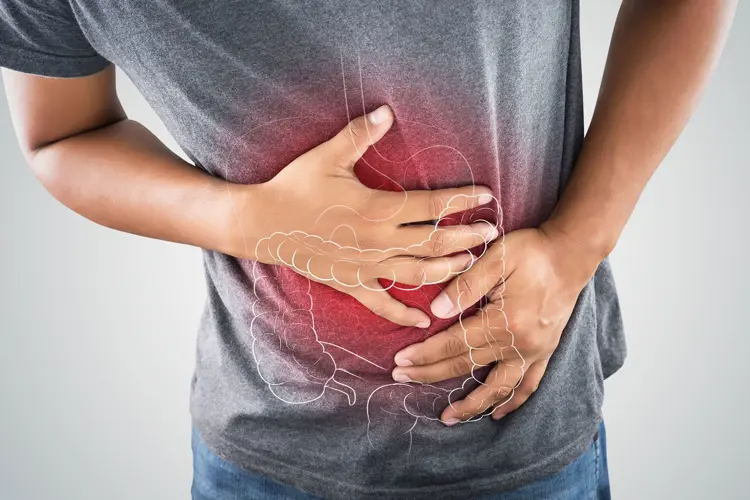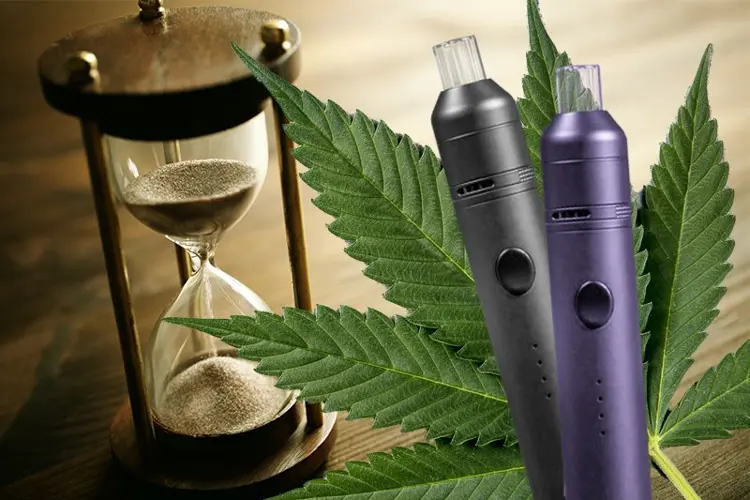Cannabinoids have a complex relationship with the gastrointestinal (GI) system.
Most hemp consumers are familiar with cannabidiol (CBD) and its stress-reducing abilities. Years have passed since it was thrust into the spotlight, yet researchers are still uncovering new evidence of CBD’s novel anti-inflammatory, analgesic, and neuroprotective abilities. It’s earned its status as the staple cannabinoid for relaxation and relief from daily aches.
Recreational CBD products are well-tolerated, in general—as long as you stick to trusted retailers with transparent safety testing. Side effects are a price that, unfortunately, some of us must pay to get the benefits we want. You can’t pick and choose how your body responds to cannabinoids, or any kind of substance.
Consulting a healthcare provider before a regime change can be worthwhile. Your doctor may be able to clue you into potential adverse effects, particularly if you have a pre-existing health condition. CBD oils are low-risk, but they’re not the best solution for everyone.
All of these raise questions: does CBD help or hurt the gut? Is this yet another bullet in CBD’s growing list of benefits, or should users with a sensitive stomach be wary? Here’s what to keep in mind before your next session with CBD gummies, bud, or oils.
What causes constipation?
We can’t explore CBD’s possible role in constipation without seeing the full picture. Cannabinoids are far from the only substance or condition that influences digestion.
Cutting CBD or cannabis products out of your regime won’t necessarily reverse a bout of constipation. The best course of action is to take a step back and consider the possibilities since, chances are, CBD alone isn’t at fault. Constipation doesn't always have a clear cause, either.
Contact your doctor if the situation is recurring. Over-the-counter laxatives or stool softeners might help, but getting to the root of the issue is a better solution.
Constipation, either chronic or short-term, may be caused by:
- Dehydration: Without enough water, the texture of your waste can change drastically. If you aren’t giving your colon the fluids it needs to soften stools, they won’t come out as easily.
- Dietary deficiencies: Low-fiber diets are the obvious offender here. Still, lack of fiber isn’t the only deficiency that promotes constipation. Make sure you’re getting enough vitamin D, folic acid, and vitamin B1, among other key vitamins and minerals.
- Overindulging: On the flip side, consuming an excessive amount of certain nutrients (including vitamin B12 and iron) may cause constipation. The short of it is to stick to a balanced diet whenever possible. If you’re not sure where to start, a doctor or nutritionist can help.
- Stress: Fight or flight responses don’t bode well for the gut. When your body is under constant physical or emotional stress, survival is the priority, not digestion. It’s common to notice a drop in appetite, nausea, or other digestive irregularities during periods of high stress.
- Inactivity: You don’t need to spend hours working out every single day. Just focus on squeezing in physical movement where you can, especially if constipation has become your norm. When you slow down for too long, so does your digestion. Even taking a daily walk can help.
- Medications: Constipation is a side effect of numerous medications, both prescription and over-the-counter. Be on the lookout if you’re taking opioids (morphine, oxycodone, etc.), antipsychotic medications, non-steroidal anti-inflammatory drugs (NSAIDS—including aspirin and ibuprofen), antihistamines, or tricyclic antidepressants. Certain blood pressure or anti-nausea medications also carry this risk.
- Health conditions: Even if your diagnosis isn’t directly gut-related, it could still make you susceptible to constipation. Parkinson’s, multiple sclerosis, and metabolic disorders are just a few examples.
And that’s only the beginning. Age, pregnancy, and holding in your stool can also play roles.
It can hardly be overstated when it comes to health: talk to your doctor if you have any concerns. Those experiencing constipation as a medication side effect may be able to adjust their routines. Dietary changes can also make a huge difference.
Can CBD cause constipation?
Yes, CBD can cause constipation, but it’s just an uncommon side effect. You’re more likely to face the opposite problem, and even then, the risk of CBD-induced diarrhea is also relatively low.
Loose stools, gas, and bloating are potential reactions to CBD, but only a minority of users appear to face these issues. Besides, CBD may not be the sole contributor in cases where diarrhea is reported. Drug interactions, medical conditions, and the method of consumption must be considered.
Is this your go-ahead to proceed without care? No, especially if you already experience regular digestive distress. Any changes in routine can heighten your risk.
It’s theorized that high doses of CBD may relax the digestive system and make it easier to poop. However, at extremely high doses—particularly those taken over an extended period—the gut microbiome might suffer damage. CBD’s long-term effects are still under investigation.
Starting slow is always best when experimenting with cannabinoids. By sticking to a small dose (half a gummy or less, one drop of oil, etc.), new users can identify adverse reactions before they get out of hand. Take a bit of CBD, monitor your body’s response, and bump up your dose if all is well.
CBD gummies and constipation
But by consuming cannabinoids in edible form, you’re ingesting more than just the raw compound, and the products used to create the gummies could affect your digestion. Gummies are one of the most popular CBD delivery methods, and unlike vapor or smoke, they require help from the stomach and intestines. Check out CBD capsules if you want an edible product that’s easier on your stomach.
A standard CBD oil blends the cannabinoid extract with a plant-based carrier oil, such as coconut or hemp seed. You’re in a new ballpark when you switch to gummies. These CBD treats often feature ingredients like:
- Sweeteners
- Natural or artificial colors and flavors
- Gelatin (or a plant-based alternative)
- Preservatives
Low-calorie sugar alcohols, such as maltitol or sorbitol, may act as laxatives if consumed in excess. Sucrose (table sugar) can also disrupt your gut’s microbiome.
Even stevia and monk fruit extract can irritate the gut and reduce motility, so the “all-natural” path isn’t an automatic win. CBD chocolates aren’t much better, particularly if they contain lactose.
You’re probably noticing a pattern. Constipation is a risk if you’re sensitive to gelatin, which can be difficult to digest. Candy also provides little to no fiber to help move things along.
Fortunately, these hassles are avoidable if you stay away from sweet treats and stick to other forms of CBD. Oils aren’t your only alternative, either. Weed vapers might prefer CBD vape pens or CBD carts if convenience is their priority, but high-CBD flower is another easy-to-find option.
CBD and gut health: who actually benefits?
If you’ve spent time exploring health supplements and tweaks to (supposedly) improve overall health, you’ve probably noticed an emphasis on the gut. Nonintoxicating cannabis products are occasionally marketed from this angle.
Whole-body health is a concept you’ll hear about often in holistic healing circles. When you treat one area, the effect may spread to other systems throughout our bodies. In theory, a small adjustment can have a far-reaching impact on the individual’s well-being—for better or for worse.
There are obvious limitations to this idea. Treating an issue by balancing others isn't always feasible, and sometimes, managing the symptoms is the best we can do. Tending to your gut won’t rid you of all ailments.
That said, full-body synergy is worth paying attention to here. Not only is the gut home to key endocannabinoid system (ECS) receptors, but cannabis itself has shown promise as a GI therapy. We already have evidence of its usefulness in managing abdominal pain, nausea, anorexia, and diabetic gastroparesis.
However, CBD hasn’t yet been approved by the United States Food and Drug Administration (FDA) as a treatment for any of these conditions. As it stands, the only FDA-approved CBD-based drug is Epidiolex, used to reduce seizures in those with Dravet or Lennox-Gastaut syndromes. We’ll need more research before any intestinal CBD therapies are developed and approved.
CBD and inflammatory bowel disease (IBD)
Cannabis researchers are exploring CBD as a potential therapy for inflammatory bowel disease (IBD—including ulcerative colitis and Crohn’s disease). The focus isn’t yet on replacing tried-and-true IBD medications, but instead, finding supplemental treatments with a low risk of side effects. CBD could improve day-to-day comfort for IBD patients, some of whom already swear by it.
As their classification suggests, both Crohn’s and UC are inflammatory diseases of the GI system. Crohn’s can target any region, and during a flare, patients typically experience patches of inflammation throughout their digestive tract. UC is specific to the colon and rectum.
Our gut’s close relationship with other systems is clear in these conditions. Not only do they take a toll on GI health, but dysregulation of antibodies often branches into other parts of the body—joints being a common target. Balancing the GI system can modulate these extraintestinal symptoms.
The ECS plays a prominent role in immune events. During an IBD flare, the immune system kicks into overdrive, attacking healthy GI cells. Bleeding, pain, and digestive irregularity are just a few outcomes. By targeting the ECS, it might be possible to take control of inflammatory immune responses.
CBD and irritable bowel syndrome (IBS)
Although common, IBS is a challenging condition to live with. Those with this disorder may experience frequent bouts of abdominal pain, bloating, and other digestive disturbances. Treatment is highly individualized, and while medications can be prescribed to reduce symptoms, the burden often falls onto the patient.
Now, onto the disappointing news: research has reached mixed conclusions. CBD’s analgesic and body-soothing abilities mean that promise exists, but it’s unclear how effective CBD is at reducing major IBS symptoms. Unlike in UC and Crohn’s, GI inflammation isn’t at the core of IBS, nor do symptoms stem from a misfiring immune system.
A 2022 study found that chewing CBD gum matched a placebo in reducing IBS-related pain, as reported by patients.
If you have IBS and find that CBD gives you a boost, then go ahead. It’s a low-risk self-care option. Anecdotes still hold weight, and it isn’t hard to find IBS sufferers vouching for CBD.
Is CBD the only cannabinoid for gut health?
CBD is probably not the only cannabinoid to offer help for sufferers of intestinal and digestive conditions. Given the gut’s close relationship to the ECS, it’s extremely likely that CBD isn’t alone in this fight. In fact, both THC and CBG have growing bodies of evidence in the field of GI modulation and digestive care.
Full disclosure: it’s also entirely possible that cannabinoids (including THC) may also have adverse effects on digestion. A limited collection of studies have linked cannabis use to acid reflux and peptic ulcer disease.
The short of it? We don’t know everything there is to know about weed and the gut. Hopefully, as research develops, we’ll gain a clearer picture of their relationship.
President Trump promised during his election campaign to “save vaping," but his administration has undermined that goal at every turn.
The U.S. disposable vape market has grown to $2 billion in annual sales, although nearly none of the products are authorized by the FDA.
More than 30 bills that would impose severe restrictions vaping consumers’ product choices remain active in U.S. state legislatures.
The Freemax REXA PRO and REXA SMART are highly advanced pod vapes, offering seemingly endless features, beautiful touchscreens, and new DUOMAX pods.
The OXVA XLIM Pro 2 DNA is powered by a custom-made Evolv DNA chipset, offering a Replay function and dry hit protection. Read our review to find out more.
The SKE Bar is a 2 mL replaceable pod vape with a 500 mAh battery, a 1.2-ohm mesh coil, and 35 flavors to choose from in 2% nicotine.





















